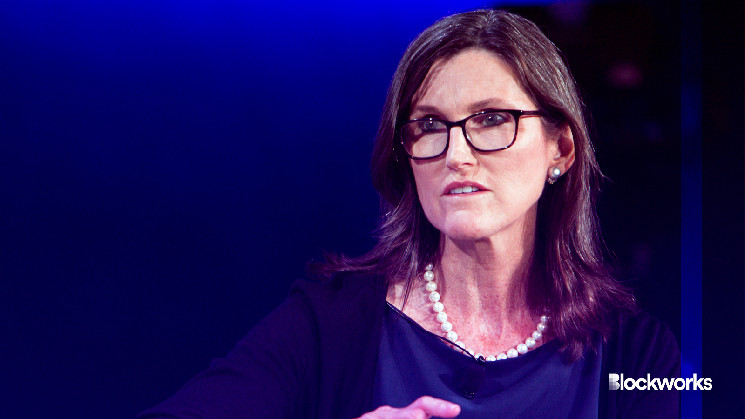Executives at two of the issuers jointly looking to launch a spot ether ETF have differing views on whether such funds will gain near-term approval.
Ark Invest CEO Cathie Wood said this week during a podcast with Blockworks co-founder Jason Yanowitz that “the probability is probably going down” for the Ark 21Shares Ethereum ETF, and other similar products, to be approved in May.
Industry watchers expect the Securities and Exchange Commission to rule on spot ether proposals on or around May 23 — the date when the regulator’s 240-day clock to decide on the first such applications expires.
“One of the tell-tale signs for bitcoin that something was gonna happen with the spot bitcoin ETF was the fact that we were communicating with the SEC,” Wood said. “I just think that the SEC is still biding its time, maybe studying the issues.”
Read more: Ether ETFs coming in May? Here’s why many are bearish
The SEC approved 10 spot bitcoin ETFs in January — the first products of their kind to hit the US market.
Ark Invest partnered with European crypto ETP specialist 21Shares to launch one of those BTC funds. That ETF currently has roughly $3 billion in assets under management, the fourth-most in the segment behind Grayscale Investments, BlackRock and Fidelity.
21Shares co-founder Ophelia Snyder noted the main reason that bitcoin ETFs were approved: a Grayscale legal victory over the SEC last year. Judges ruled in an August decision that the SEC allowing bitcoin futures ETFs, but blocking the Grayscale Bitcoin Trust (GBTC) from becoming an ETF, was “arbitrary and capricious.”
The SEC allowed ETFs that hold ether futures contracts to start trading in October.
Given “how fresh most of the documentation is,” Snyder told Yanowitz she is less bearish than Wood and others around the chance of spot ether ETFs gaining approval soon.
“There are not a lot of differences between these filings for Ethereum and the filings for bitcoin,” the 21Shares executive noted. “They’re the same structure, the same custodians, the same disclosures. It’s very internally consistent. That means there’s less to look at.”
Still, Wood said she believes the language in proposals around staking the planned funds’ assets has been “a sticking point” for the SEC.
Staking ether is the process of depositing ETH to help secure the Ethereum blockchain — and earning yield on that ETH for doing so.
An amended proposal filed by Ark and 21Shares last month said the sponsor “may, from time to time, stake a portion of the trust’s assets through one or more trusted staking providers.” Fidelity and Grayscale have made similar additions to their ether ETF applications.
Read more: Ark 21Shares amends spot ether ETF proposal to include staking language
Bitwise filed for a spot ether ETF Thursday, though its proposal did not include details about the fund potentially staking its assets.
Marshall Beard, chief operating officer at Gemini — a custodian for VanEck’s spot bitcoin ETF and in discussions related to the proposed ETH funds — previously told Blockworks he believes spot ether ETFs that stake assets are “not going to be version one.”
ETF.com senior analyst Sumit Roy argued that staking is a feature that makes ether look more like a security, “which the SEC won’t look favorably upon,” he noted.
BlackRock, the world’s largest asset manager, is another issuer with a spot ether ETF proposal in front of the SEC. The company’s CEO, Larry Fink, noted during a Thursday interview with Fox Business News that the designation of ether as a security or commodity might not have a big impact on whether such a fund gets greenlit.
When asked directly during the interview whether BlackRock could launch a spot ether ETF even if ETH is labeled a security, Fink added: “I think so, yeah.”
Read the full article here









